Words of Wisdom - Shastra
& Shastrakaras speak
For Books and shastra downloads see Main Index, under
Books:
Om Namo Bhagavate Vasudevaya
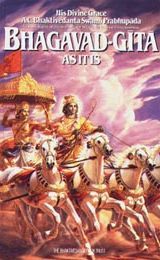
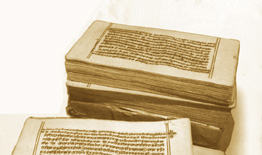
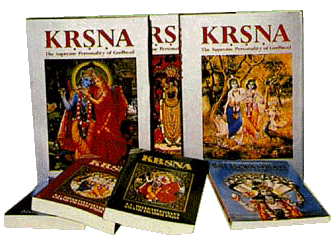
The Complete Works of Srila Prabhupada
All the books, the letters and conversations at your
fingertips
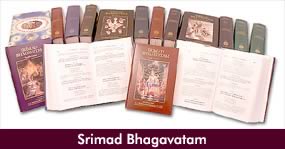
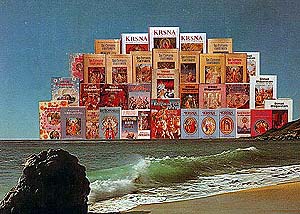
All Srila Prabhupada's books and more on one disk
http://www.vedabase.com




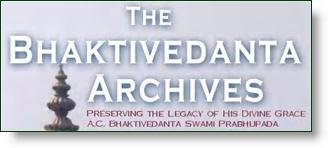
Srila Prabhupada's Audio lectures to listen to on-line:
http://www.hare-krishna.org/srila-prabhupada-lectures.htm
Listen to Srila A.C. Bhaktivedanta Swami Prabhupada on-line
- all 900 of his lectures are available HERE:
http://www.prabhupadavani.org/
Srimad Bhagavatam - the entire lecture series listen and
read along on-line - Narrated by Amala Bhakta dasa:
http://www.prabhupadavani.org/SB_index.html
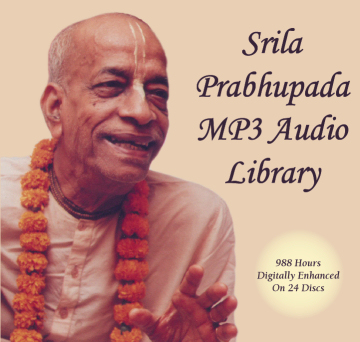
The new enhanced Prabhupada MP3 series
http://www.prabhupada.com/store/store.php?page=product.php&id=MP3AUDIOLIB








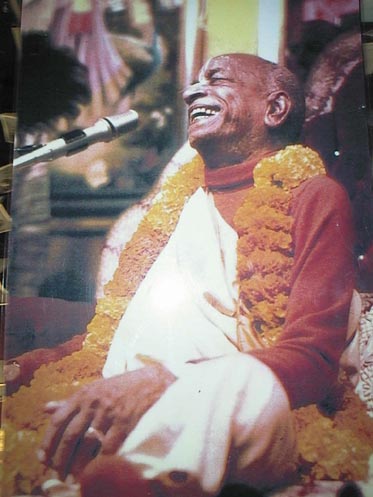
Visit "Prabhupada Connect" for all manner of Prabhupad
Nectar:
http://www.prabhupadaconnect.com/Index.html
Srila Prabhupada's Final Lesson Video - Downloadable and
viewing on-line
http://users.iskconludhiana.com/images/thumbnails.php?album=21


All Srila Prabhupada's original books
available for sale here.

Download all the Hare Krsna teachings which includes
all Vaisnava and
Vedic concepts by visiting one of the sites listed at
the following address.
http://www.geocities.com/suci123/bookdownloadsites1.html
The Bhaktivedanta Book Trust
Srila Prabhupad Memorial Library
http://www.krishna.com/main.php?id=33


33 Books Online Including Srimad Bhagavatam!
http://www.geocities.com/freeprabhupadabooks
The compressed "self extracting" file mentioned is now currently
available for download
http://www.krsnaconsciousness.org/Gauranga/Folio/BhaktivedantaVedabase_DOS.exe

Download or Listen to Prabhupad Bhajans HERE:
http://www.prabhupadavani.org/web/text/Bhajans.html


On-line 1972 McMillan edition - Bhagavad Gita As It Is:
http://www.asitis.com/

Bhagavad Gita AS IT IS on-line through the Tirupathi
Balaji site:
http://www.bhagavad-gita.us/

Bhagavad Gita Study guide on-line book:
http://chantandbehappy.com/gita/studyguide/StudyGuide-main.htm
Bhagavad Gita Study guides by numerous Iskcon devotees
- FREE downloads:
http://www.veda.harekrsna.cz/library/#3

All the Scriptures you'd ever need 4 FREE
http://www.hknet.org.nz/index-books.htm
http://www.hknet.org.nz/DDB.htm
http://www.hknet.org.nz/DDB2.html
last updated 4th August 2003


Srimad Bhagavad Gita AS
IT IS
Bhagavad Gita: Chapter
6 - Dhyana-yoga
TEXT 33
arjuna uvaca
yo 'yam yogas tvaya proktah
samyena madhusudana
etasyaham na pasyami
cancalatvat sthitim sthiram
WORD FOR WORD
arjunah uvaca--Arjuna said; yah ayam--this system; yogah--mysticism;
tvaya--by You; proktah--described; samyena--generally; madhu-sudana--O
killer of the demon Madhu; etasya--of this; aham--I; na--do not; pasyami--see;
cancalatvat--due to being restless; sthitim--situation; sthiram--stable.
TRANSLATION
Arjuna said: O Madhusudana, the system of yoga which You
have summarized appears impractical and unendurable to me, for the mind
is restless and unsteady.
PURPORT by HDG Srila A. C.Bhaktivedanta Swami Prabhupad:
The system of mysticism described by Lord Krsna to Arjuna
beginning with the words sucau dese and ending with yogi paramah is here
being rejected by Arjuna out of a feeling of inability. It is not possible
for an ordinary man to leave home and go to a secluded place in the mountains
or jungles to practice yoga in this Age of Kali. The present age is characterized
by a bitter struggle for a life of short duration. People are not serious
about self-realization even by simple, practical means, and what to speak
of this difficult yoga system, which regulates the mode of living, the
manner of sitting, selection of place, and detachment of the mind from
material engagements. As a practical man, Arjuna thought it was impossible
to follow this system of yoga, even though he was favorably endowed in
many ways. He belonged to the royal family and was highly elevated in terms
of numerous qualities; he was a great warrior, he had great longevity,
and, above all, he was the most intimate friend of Lord Krsna, the Supreme
Personality of Godhead. Five thousand years ago, Arjuna had much better
facilities than we do now, yet he refused to accept this system of yoga.
In fact, we do not find any record in history of his practicing it at any
time. Therefore this system must be considered generally impossible in
this Age of Kali. Of course it may be possible for some very few, rare
men, but for the people in general it is an impossible proposal. If this
were so five thousand years ago, then what of the present day? Those who
are imitating this yoga system in different so-called schools and societies,
although complacent, are certainly wasting their time. They are completely
in ignorance of the desired goal.
His Divine Grace A.C. Bhaktivedanta Swami Prabhupada
Copyright 1983 The Bhaktivedanta Book Trust International. Used with
permission.

Bhagavad Gita As It Is - http://www.asitis.com/
Bhaktivedanta Vedabase - Bhagavad Gita on-line http://bhagavadgitaasitis.com/
Bhaktivedanta VedaBase: Bhagavad-gita As It Is http://vedabase.net/bg/en
Bhagavad Gita Multi Media Web-version http://chantandbehappy.com/gita/
Listen to Bhagavad Gita on line - http://www.Gitamrta.org
View our Bhagavad Gita Overview:
http://www.hknet.org.nz/BG.html
Archive: http://www.cs.rice.edu/~vivek/btg/archive/
Home Page: http://www.cs.rice.edu/~vivek/btg/
Join Bhagavad Gita eGroups HERE
mailto:bhagavad_gita-owner@egroups.com


Prabhupada Uvacha:
(here's some nectar, sometimes it comes in the form of Srutakirti prabhu's
diary, other times from Govinda dasi's diary, Hari Sauri prabhu's Transcendental
Diary, Bhurijan prabhu's book, or sometimes from a letter, or other related
source, but still nectar...)
Knowing the Truth
While a roaring kirtana continued downstairs,
Prabhupada gave a short audience in his room to our Italian printer, Bruno.
A jolly, rotund man with rosy cheeks, Bruno appeared simple and unpretentious.
He couldn't speak English, but he spoke fluent French through a devotee
interpreter. Although he said he had many questions to ask Srila Prabhupada,
he thought that Prabhupada might be feeling to tired to meet with him.
Prabhupada, however, assured him he wasn't.
Bruno said he was interested in the pursuit of
truth. He was impressed with both the devotees' character and lifestyle.
He wanted to know what our goal was and what freedom we derived from our
activities.
Prabhupada told him that liberty means "whatever
you like you can do," but now we can't do what we like. In the spiritual
world, though, we are free to travel anywhere we want, like Narada Muni.
He said this type of freedom was just one item of spiritual life and there
were many others.
Bruno wondered whether he could find spiritual
truth by following his own path, by keeping his own freedom to do whatever
he liked, or if it required daily adherence to scriptures and principles.
Prabhupada told him, "No, you have no freedom;
you have to accept some way for freedom."
Yogesvara explained that Bruno found it difficult
to accept that truth was something that can be described in black and white.
"He seems to feel that it's more something you can realize through meditation."
"How you'll realize?" Prabhupada asked him. "Unless
you learn ABCD, how you can realize truth?"
Bruno said that since each person finds the truth
in himself, didn't that mean that the truth is different for each person?
He felt that each person had own his truth; although the truth is one,
as individuals we all realized that truth at different levels.
"That is rascaldom," Srila Prabhupada told him.
"Truth is one."
Bruno suggested that one person may have a higher
knowledge of that truth while another may have a lower.
"That is different thing," Srila Prabhupada replied,
"but truth is one. Just like top floor is one. And one has gone few steps,
another hundred steps, one has got ten steps, that is depending. But top
is one."
Bhugarbha asked, "Can he find the truth on his
level, because he hasn't arrived at your level?"
Prabhupada shook his head. "How he can? If the
top floor is hundred steps, how you can get it at ten steps?"
Bhagavan said a person had to at least be aiming
in the right direction.
Prabhupada agreed, adding, "But one who has gone
ten steps and one who has gone thousand steps, they are not equal."
Now Bruno understood. He nodded his head, "D'accord,
d'accord."
"So, truth is one," Prabhupada went on. "Everyone
is trying to go to the truth. Somebody has gone ten steps, somebody has
hundred steps. But to cover all the steps, say one thousand steps. So unless
you have passed one thousand steps, you cannot reach to the truth."
Bruno said that it has always been difficult for
him to keep climbing up the stairs in the right direction.
Srila Prabhupada smiled at us. "So we shall give
him a lift, one second. You haven't got to go step by step; we shall give
immediately, one minute. If you refuse to take the advantage of the lift,
that's your choice. Krsna personally says, sarva-dharman parityajya mam
ekam saranam vraja/ aham tvam sarva-papebhyah. Immediately, one second.
But we will not accept, that is our misfortune."
Bruno admitted it was difficult for him.
"Why difficult?" Prabhupada declared. "Obstinacy.
It is not difficult, it is obstinacy. 'I'll not take.'A child can take."
Bruno said that for a child it was simple because
he's pure and can accept everything presented to him; but for those who
are older and already engaged in so many contaminated activities, it was
hard.
Still Prabhupada didn't accept. "No, there is
no question. It is apratihata, it cannot be checked by old age or any material
condition."
Bruno laughed. He said he wasn't free to choose
because the devotees were always forcing him to take prasadam.
"Yes, this child has to be forced to do something,
for his interest. Just like horse is not prepared to take the medicine,
but four men force him to take the medicine. Nobody was crying for this
edition of Bhagavata, but we are forcing, 'You must read. You must take.'
We are printing and forcing everyone. French edition Bhagavata, they were
not dying for this book, but this is our force."
Bruno was very satisfied with the answers and
he thanked Srila Prabhupada. He promised that he would go on trying to
make his books look even nicer.
"Very good, do that," Prabhupada thanked him.
"That will be service to Krsna."
- From the "A Transcendental Diary Vol 3" by HG
Hari Sauri dasa
To receive little snippets of nectar like this on a daily basis subscribe
HERE: or If you want to introduce anyone else in reading Srila Prabhupada
Nectars, please send their eMail addresses to mailto:krpamaya_gauranga@hotmail.com
Please Chant:
 Hare
Krishna Hare Krishna Krishna Krishna Hare Hare
Hare
Krishna Hare Krishna Krishna Krishna Hare Hare
 Hare
Rama Hare Rama Rama Rama Hare Hare
Hare
Rama Hare Rama Rama Rama Hare Hare
...................and be Happy

Listen to Srila Prabhupad on-line
....a different lecture, morning walk, conversation or
class daily.
"Civilized--Less Then Animal"
Srimad-Bhagavatam 1.3.14
September 19, 1972, Los Angeles
Listen to the entire lecture on-line:
http://prabhupadaradio.com/M3U/Bhagavatam/m3u_II/SB071.m3u
Pradyumna: (leads chanting, etc.)
rsibhir yacito bheje
navamam parthivam vapuh
dugdhemam osadhir vipras
tenayam sa usattamah
Translation: "O brahmanas, the ninth incarnation of the
Lord, prayed for by sages, was King Prthu, who cultivated the land to yield
various produces, and for that reason the earth was beautiful and attractive."
Prabhupada: So this refers to King Prthu, Maharaja Prthu.
So his father's name was King Vena. And his father's name was... I don't
remember. Perhaps Anga, like that. So the Vena's father married one woman.
She was the daughter of Death, means the family was not very good. So as
a result of this marriage, a son was born, whose name was Vena, who came
out to be first-class rogue. So the father of Vena wanted to reform him
in so many ways, but he could not. The son was not to be corrected. So
the father became disgusted, and one day he left home without any knowledge
of the family members or the officers and king. He left.
Then the great sages and brahmanas, because without king
there was irregularities in the kingdom... Just like we have got experience.
If there is no good government, strong government, the rogues, thieves,
smugglers and so many other disrupting elements, they will grow. Because
they are always existing. They find out the opportunity. As soon as there
is some revolution, political upsurge, or mismanagement of the government,
these undesirable elements, they come out. So when the father of Vena Maharaja
left home, the kingdom became unruly. Therefore the sages and saintly persons,
they asked the queen that "Your son, although he is worthless, so let him
become king. There must be some king."
So this Vena was made king by the desire of the saintly
person. The significance is that formerly the brahmanas, the ksatriyas,
the vaisyas and the sudras, these four departments, they must remain. Varnasrama.
That must be maintained, class division. So the brahmanas, the saintly
persons, sages, they used to recommend that "Yes, this person is fit for
becoming king." Then the coronation was celebrated. Or... This means that
the ksatriyas were under the order of the brahmanas. So when Vena become
king, of course, the rogues and thieves, they were immediately subdued.
Because rogues and thieves, and here the king is also greater rogue. So
the smaller rogues were subdued immediately. That was one of the benefit,
because he was very strong and cruel. Immediately, caught a rogue, he will
immediately cut off his head. So they were subdued. But he himself is a
rogue. Nunam mahatam tatra. This is our experience. "Might is right." If
you are stronger, then you can subdue less strong. But he became very much
disturbing. He was atheist, and he ordered that "There is no God. I am
God. So what I say, you have to abide." The brahmanas were also... "You
cannot perform yajnas. This is not required." In this way, he became too
much disturbing.
Then one day all the brahmanas and the sages, they came
to give him instruction: "My dear king, it is not your duty to stop all
kinds of religious activities." Just like the Communist government. Yes.
But who hears? He said, "No. Why you are trying to pacify God? I am God.
You just act. If you are actually God conscious, then you act according
to my order." So when the sages and brahmanas became disgusted, he was
killed by the brahmanas, by their order. You see? The brahmanas were so
strong. By simply cursing, they could kill anyone. So the Vena was killed.
Then again the rogues and thieves came out. Then from the body of Vena,
they created two sons. One son was black, and he was ordered that "You
go to the forest." Because they could know that he was exactly son of the
father. Nisada. Nisada. They were sent... He was sent to the forest. And
then the King Prthu was born. The King Prthu, He is incarnation of, power
incarnation of God. Saktyavesavatara So he proved himself as a great king
on this earth. He produced foodstuff, foodgrains, profusely.
That from the life of King Prthu we can understand. We
are discussing that in the Fourth Canto, the life of Maharaja Prthu, how
good government can be maintained. Prthu Maharaja is the ideal king. He
produced, he made arrangement. The earth was not producing sufficient foodgrains,
so he attacked the earth that "Why you are not producing?" The mother earth
said that "Because the people have become demon and they are simply eating,
but they are not doing their duty. Therefore I have minimized producing
grain." This is to be very important, that the earth can produce any amount
of foodgrains. There is no question of overpopulation. There is no question
of overpopulation, because everyone is being fed by the mercy of God. Eko
bahunam yo vidadhati kaman. God is giving everyone the foodstuff.
I have several times explained in this class that nobody
has got any food problem. Simply the so-called civilized, advanced in science,
these people have got problems of foodgrains. Otherwise, there are millions
of elephants, they are eating very nicely. There are ants, there are elephants,
there are tigers, there are monkeys, there are trees... So many, 8,400,000
forms of body. How they are eating? Unless they are eating... We kill animals,
but the animals do not come to the..., to us, that "We are starving. Give
us food." Never. By nature, there is arrangement, foodstuff. The cows,
the other animals, they are eating grass. There is profuse growth of grass.
So they are not eating your nice foodstuff, sandesa, rasagulla. You are
making sandesa, rasagulla from the milk which they deliver. They are eating
grass and delivering you nice foodstuff, milk. And from the milk, you can
make hundreds and thousands of nice, nutritious, full of vitamin foodstuff.
But no. We are so fool that instead of utilizing the milk, we are utilizing
the blood. You see?
These rascals, the scientists, they do not know that milk
is nothing but transformation of the blood. That everyone knows. So if
you want to... That is nature's way, by God's will, that a cow gives forty
pounds, fifty pounds milk daily, but it does not drink. Although it is
her milk, no, it gives you, human society: "You take. But don't kill me.
Let me live. I am eating only grass." Just see. And the civilized men killing
them, killing them. And they want peace. Just see the fun. Without touching
your foodstuff, the cow is eating the grass which is given by God, immense
grass, and they are giving you the finest foodstuff, milk. Just after your
birth you have only to drink milk, either mother's milk... Nowadays, mothers
do not supply milk. That is also to be supplied by the cow. So from the
very beginning of my life I am subsisting by the foodstuff given by mother,
cow, and when I am grown up, I kill. This is my gratitude. Just see. And
they are called civilized. Less than lowest animal, naradhama. They are
called naradhama, lowest of the mankind. Those who are killing cows, maintaining
slaughterhouse, they are lowest of the mankind. They are not human being.
Less than animal. They have no gratitude.
continued.......................
Listen to the entire lecture on-line:
http://prabhupadaradio.com/M3U/Bhagavatam/m3u_II/SB071.m3u
or receive in mailbox and Subscribe HERE:
mailto:lectures-subscribe@prabhupadavani.org
Sravanam kirtanam at:
http://www.PrabhupadaVani.org
© 2001 The Bhaktivedanta Book Trust International. Used with permission.

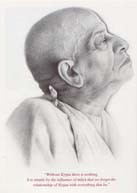
SRILA PRABHUPADA'S QUOTE OF THE DAY
This Maya will attack the body always, because the body itself is the
source of all troubles.
We try to make a solution of our misfortunes, but at the same time
we want to keep this body.
Letter to Brahmananda, Los Angeles1968
Sign-up to receive these quote HERE:
mailto:haribol@pacific.net.sg

Bhaktivedanta Vedabase Network ...
http://vedabase.net/


The Scientific - Mathematical
Proof for God's existence:
http://geocities.com/sector114
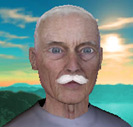
http://robot-hosting.com/php/login_nicholas.html
user name = guest
password = guest
(Collection of philosophical and mathematical proofs
for existence of God can be found in this site.)

Scientifically Philosophical Books for the layman
 ...
...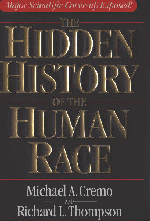 ...
...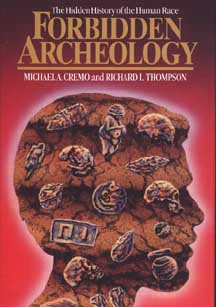 ...
...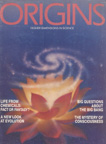
Click on any of these books to read more about them and where to get
a copy
or contact your local temple for purchases
sample of Life
comes from Life HERE.pdf

Lotus Imprints - Preserving Prabhupada's Legacy - The
Publishing House of Hari Sauri dasa
http://www.lotusimprints.com/

Quotes from Shastra - scriptures
View using Balaram font
"The Cäturmäsya period
begins in the month of Äñäòha (June-July) from
the day of Ekädaçé called Çayanä-ekädaçé,
in the fortnight of the waxing moon. The period ends in the month of Kärtika
(October-November) on the Ekädaçé day known as Utthänä-ekädaçé,
in the fortnight of the waxing moon. This four-month period is known as
Cäturmäsya. Some Vaiñëavas also observe it from the
full-moon day of Äñäòha until the full-moon day
of Kärtika. That is also a period of four months. This period, calculated
by the lunar months, is called Cäturmäsya, but others also observe
Cäturmäsya according to the solar month from Çrävaëa
to Kärtika. The whole period, either lunar or solar, takes place during
the rainy season. Cäturmäsya should be observed by all sections
of the population. It does not matter whether one is a gåhastha or
a sannyäsé. The observance is obligatory for all äçramas.
The real purpose behind the vow taken during these four months is to minimize
the quantity of sense gratification. This is not very difficult. In the
month of Çrävaëa one should not eat spinach, in the month
of Bhädra one should not eat yogurt, and in the month of Äçvina
one should not drink milk. One should not eat fish or other nonvegetarian
food during the month of Kärtika. A nonvegetarian diet means fish
and meat. Similarly, masüra dhal and urad dhal are also considered
nonvegetarian. These two dhals contain a great amount of protein, and food
rich in protein is considered nonvegetarian. On the whole, during the four-month
period of Cäturmäsya one should practice giving up all food intended
for sense enjoyment."
Sri Chaitanya Charitamritam Madhya
lila 4:169 purport.
See more about Chaturmasya BELOW:

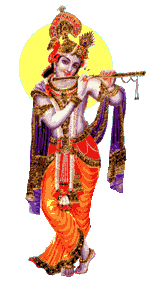
Who is Sri Krishna? What is Sri Krishna Janmastami?
Sri Krishna Janmastami - Appearance of Lord Sri Krishna (Fasting
'till Midnight)
http://www.hknet.org.nz/calendar-janmastami.htm
Ekadasi style breakfast for Janmastami at midnight
http://www.hknet.org.nz/E-prasad.htm
Nandotsav - Jata karman of Sri Krishna by Nanda maharaj
http://www.hknet.org.nz/Nandotsav.htm
Krishna is God, the Supreme Personality of Godhead. This fact is stated
and corroborated in the Vedic scriptures and by various authorities. Lord
Brahma in Brahma Samhita says, "Krishna who is known as Govinda is the
Supreme Godhead. He has an eternal blissful spiritual body. He is the origin
of all. He has no other origin and He is the prime cause of all causes"
(BS 5.1). In the Bhagavata Purana Krishna becomes the chief object of devotion.
After describing various incarnations of the Lord such as Rama, Balarama,
Vamana, Nrsimha, and Vishnu, Srila Sukadeva Goswami states, "All of the
above mentioned incarnations are either plenary portions or portions of
the plenary portions of the Lord, but Lord Krishna is the original Personality
of Godhead" (SB 1.3.28).
Lord Shiva in Gita Mahatmya, states that "only one God - Krishna, the
son of Devaki" (Verse 7). In the Padma Purana it is stated, "By scrutinizingly
reviewing all the revealed scriptures and judging them again and again,
it is now concluded that Lord Narayana is the Supreme Absolute Truth, and
thus He alone should be worshipped". Similarly it is said in the Skanda
Purana, "In the material world, which is full of darkness and dangers,
combined with birth and death and full of different anxieties, the only
way to get out of the great entanglement is to accept loving transcendental
devotional service to Lord Vasudeva. This is accepted by all classes of
philosophers".
The position of Krishna as God is confirmed by great personalities like
Narada, Asita, Devala, Vyasa, Parasara, Brahma and Shiva. Finally Krishna
Himself confirms this fact in the Bhagavad-gita to His friend and devotee,
Arjuna. He clearly says that He is "the Supreme Lord of all planets and
demigods" (BG 5.29), that "there is no truth superior to Me" (BG 7.7) and
- "I am the source of all spiritual and material worlds. Everything emanates
from Me" (BG 10.8).
What is the position of Krishna?
As God, there is no one equal to or greater than Krishna. He is the
original, unborn, eternal person, the most ancient, completely independent,
and the cause of all causes. Parasara Muni, the father of Srila Vyasadeva
and a great scholar who had himself held the position of Vyasa in a previous
kalpa, very nicely defines the position of Bhagavan (God) as one Who is
complete in six kinds of opulence namely - wisdom, beauty, fame, power,
wealth and renunciation. While there are many great personalities who are
very famous or very wealthy, only Krishna as God is replete in all six
opulence.
The scriptures not only give us the unique position of Krishna but also
give us a detailed description of all His aspects. They tell us that above
this temporary material universe is an eternal spiritual world called Vaikuntha,
and Krishna lives in the topmost planet of this universe called Goloka
Vrindavana which is full of palaces made of touch-stone (cintamani), with
trees that are capable of fulfilling all desires (kalpa-vraksha) and cows
that are called Surabhi.
Here Krishna eternally resides, served by hundreds and thousands of
goddesses of fortune. He sports with His most confidential and intimate
devotees, headed by Srimati Radharani. He has a form just like us but His
body is spiritual and thus eternal. His complexion is dark-blue, like that
of a rain-filled cloud and His eyes are like lotus petals. He is ever youthful,
full of bliss and His beauty excels that of thousands of cupids. He likes
to play the flute, He sports a crown with a peacock feather and He is adorned
by the exquisite kastuba jewel.
What is Krishna avatar?
In Chaitanya-charitamrita (2.20.263-264) it is stated that the "avatar,
or incarnation of Godhead, descends from the kingdom of God for creating
and maintaining the material manifestation. And the particular form of
the Personality of Godhead who so descends is called an incarnation, or
avatar. Such incarnations are situated in the spiritual world, the kingdom
of God. When They descend to the material creation, They assume the name
avatar."
The Srimad Bhagavatam states that there are countless incarnations just
like the waves of the oceans. They fall in various categories like lila
(pastime), yuga (period of yuga), manavantara (period of Manu), purusa
(Vishnu expansions) and shaktivesa (empowered). These avatars perform various
pastimes based on the time, place and circumstances, but their purpose
is always the same - "to attract the conditioned souls back to their eternal
spiritual abode".
The incarnations emanate from Vishnu. Maha-Vishnu is the original cause
of all material creation and from Him Garbhodakashai-Vishnu expands and
then Ksirodakasayi-Vishnu. Generally all incarnations appearing within
the material world are plenary portions of Ksirodakasayi-Vishnu (also known
as Hari).
However only once in a day of Lord Brahma (which lasts for 4.32 billion
of our years), does Krishna descend in His original form, as the avataree,
the cause of all avatars. When Krishna appears all the incarnations join
with Him. The Supreme Personality of Godhead is the complete whole and
all the plenary portions and incarnations always live with Him. So when
Krishna appeared, Lord Vishnu was always with Him, and while Krishna enjoyed
His pastimes in Vrindavan, the killing of the demons was actually carried
out by the His Vishnu portion. Since Krishna eternally resides in Vrindavan,
when He left Vrindavan at the age of ten, it was His Vasudeva expansion
that actually left.
Appearance of Krishna
In the era of the Svayambhuva Manu, prajapati Sutapa and his wife Prsni
were instructed by Lord Brahma to have progeny. They performed severe austerities
for twelve thousand years of the demigods to have the Lord as their child.
Pleased by their austerities the Lord appeared and granted them this benediction.
Since He gave them this benediction three times, in Satya-yuga He first
appeared as the son of Prsni and Sutapa and was called Prsnigarba. In Treta-yuga
they were Aditi and Kasyapa Muni and the Lord appeared as Vamanadeva. Finally
in the Dvapara yuga, Krishna in His original form, appeared as the child
of Devaki and Vasudeva.
Krishna appeared specifically on the request of Bhudevi, the presiding
deity of the Earth planet. Distressed by the burden of many demons who
had appeared as powerful Kshatriyas and were ruling the planet impiously,
she assumed the form of a cow and pleaded to Lord Brahma for help. Lord
Brahma with all the demigods prayed to Lord Vishnu in Svetadvipa by chanting
the Purusa-sukta prayers. At this time the Lord informed Brahma that in
order to establish religiosity and destroy evil, He would soon appear as
His original Self. In the meantime the various demigods were instructed
to take birth in various families in the Yadu dynasty and prepare for the
appearance of the Lord.
Lifeline of Sri Krishna
Historically, Lord Krishna appeared in the Dvapara yuga, on the midnight
of the 8th day of the dark half of the month of Sravan. This corresponds
to July 19th in the year 3228 BC. ( important NOTE) He exhibited His pastimes
for a little over 125 years and disappeared on February 18th 3102 BC on
the new moon night of Phalgun. His departure marks the beginning of the
current age of corruption known as Kali.
The great scholar Srila Vishvanatha Chakravarti neatly outlines Lord
Krishna's activities in this way. He was born in Mathura in the prison
cell of Kamsa and carried to Gokul. The first three years and four months
were spent in Gokula, then equal lengths of time in Vrindavan and Nandagram.
At the age of eleven He left Vrindavan for Mathura where He lived for eighteen
years and four months, and finally ninety-six years and eight months in
Dvaraka totaling about 126 years of manifest pastimes. At the time of Mahabharata,
when Krishna spoke the Bhagavad-gita, He was about ninety years of age.
Pastimes of Krishna
The tenth canto of Srimad Bhagavatam describes the activities and transcendental
pastimes of Sri Krishna. They are also described in the epic Mahabharata,
specially in the Bhishma parva which also contains the Bhagavad-gita. The
pastimes of Krishna appeal to the liberated souls, those that are trying
to get liberated and also to the gross materialists.
The pastimes of Sri Krishna, known as Krishna-katha fall into two categories.
Words spoken by Krishna, as the Bhagavad-gita, and words spoken about Krishna,
as in the Srimad Bhagavatam. Souls in the liberated stage derive great
pleasure in relishing anything and everything related to Krishna. For those
that are trying to be liberated, Krishna-katha makes their path of liberation
very clear. By studying the Gita one becomes fully conscious of the position
of Sri Krishna; and when one is situated at the lotus feet of the Lord,
he understands the narration's of Krishna as described in the Srimad Bhagavatam.
Even the gross materialists are attracted by the pleasure pastimes of
Krishna with the Gopis and His wives. Even though the loving affairs of
Krishna have nothing to do with the gross, mundane sex affairs, they attract
the people engrossed in sense-gratification and gradually elevate them
to higher levels of spirituality.
Causeless mercy of Krishna
Even though Krishna is completely self sufficient and self satisfied,
He descends for the benefit of all the conditioned souls. His most endearing
quality is that of "bhakta vatsala". His pure devotees are always trying
to please Him, and He is always trying to please His devotees. Just as
He lives in the heart of His devotees, His devotees constantly reside in
Him.
Krishna is so merciful that He not only helps His devotees, but also
those who are envious of Him. Krishna destroys evil by providing them with
an opportunity to take up devotion.
On the greatly auspicious day of Krishna-Janamashtami, let us all pray
to Sri Krishna for a drop of His causeless mercy, for only that alone is
sufficient to take us out from this material word, back home, back to Godhead.
All glories to the appearance day of Lord Krishna ! All glories
to Sri Krishna and His devotees !!
Courtesy of http://www.acbspn.com/festivals/janmastami.htm
(2002)
See more on our Janmastami pages http://www.hknet.org.nz/calendar-janmastami.htm

Sweetest Description of Janmastami-lila
from Ananda Vrindavan Champu by Srila Kavi Karnapura
Translated by Bhanu Swami & Subhaga Swami
Published by Mahanidhi Swami
Now we will discuss the truth about the transcendental
birthplace of Bhagavan and the appearance of Lord Sri Krishna. Once upon
a time, Bhumi, the predominating deity of the earth, felt overburdened
by different demons posing as members of the royal order. Feeling aggrieved
upon seeing her miserable condition, the lotus-born Brahma appealed to
Ksirodakasayi Visnu, the maintainer of the universe, saying, "Please deliver
Goddess Bhumi who is feeling greatly distressed by these demoniac kings.
Only You can remove this terrible influence from the earth."
The time for an appearance of the Lord coincided with
two internal desires of the Supreme Personality of Godhead. First the Lord
desired to descend on earth to increase the fortune of Yasoda and Nanda.
Also at that time Krishna wanted to relish the sweet mellow of smgara rasa
(paramour love) while enacting His worldly pastimes. For these two reasons
the Lord appeared within the material creation on Bhuloka, (earth planet),
along with His parents, friends, and other eternal associates.
Another distinction of Lord Krishna's earthly pastimes
is that when the eternally liberated gopis such as Srimati Radharani, Candravali,
and others appeared, the Srutis personified also appeared in the homes
of other gopis, because they had previously cultivated the desire to serve
Sri Krishna as Vraja gopis. The Dandakaranya sages, upon seeing the svakiya
bhava (the sweet conjugal relationship) of Lord Ramacandra and Sitadevi,
desired to have the same relationship with their Lord Madana Gopala. Upon
attaining perfection in their sadhana they achieved the fortunate position
of appearing as gopis in Vrindavan. Yogamaya, Lord Krishna's pastime potency
who possesses unlimited abilities, appeared invisibly in Gokula to arrange
this, and perform other difficult tasks on behalf of the Lord.
Sri Nanda, Yasoda, and others appeared in Brhadvana (Mahavana)
before the Lord. The gopas, gopis, and other eternally liberated associates
appeared after the Lord. Then those who had attained perfection by sadhana,
namely the sruti-caris and muni-caris, took birth in Vrindavan.
Learning of Krishna's imminent appearance, the earth personified,
feeling like a wife happily greeting her husband after a long separation,
immersed in unlimited joy. At the time of Krishna's birth the general mass
of people tasted the inner bliss that devotees forever relish. Auspicious
signs abounded everywhere. As Visnu's conchshell Pancajanya opens in a
clockwise fashion, similarly, auspicious sacrificial fires glowed in all
directions. Pure gentle breezes brought a refreshing coolness like devotees
who satisfy and sanctify everyone with their calm, sweet, and affectionate
behavior.
The whole atmosphere became as completely purified as
the heart of a devotee. The devotees once again found peace and prosperity
in worshiping the lotus feet of Lord Hari. Fruits filled the jubilant trees.
But the envious demons exhibited various inauspicious signs of degradation
such as rapidly aging bodies and symptoms of imminent death. The desire
vines of the celestial denizens seemed to be hanging in the air as if eager
to produce fruits. At that time all the directions became felt as pure
and joyful as the mind of a devotee who has received the mercy of Lord
Hari. Just as gems, mantras, or medicines can a remove a poisonous disease
from the body of a man, the advent of the Lord relieved the world from
the contamination of material existence and the sinful effect of the demons.
Happiness gradually replaced the distress in everyone's hearts.
The bodies of all creatures manifested extraordinary beauty
and youthful vitality. Men felt extremely joyful and displayed virtuous
qualities. Throughout the world people behaved cordially and interacted
amicably. Happiness twinkled in everyone's eye. At the end of Dvapara-yuga,
which completely destroys faults and doubts, an auspicious, favorable,
obstacle-free time appeared on the eighth day of the waning moon in Bhadra
month. Just at that sweet moment the Rohini Naksatra, along with the good
qualities of the moon and an auspicious conjunction of stars called Ayusman,
appeared in the sky to give shelter to gentle persons.
As the living entity comes out from the womb of his mother
and the moon appears on the lap of the eastern direction, Yogesvara Sri
Krishna, the personification of complete bliss, appeared amidst great festivities.
As the moon appears in the lap of the eastern direction, which is like
a beautiful bride, Krishna manifested the wonderful pastime of His appearance
out of His love and compassion for the conditioned souls.
Due to austerities performed in previous lives, Vasudeva
and Devaki received the opportunity to momentarily relish parental affection
for Lord Sri Krishna when He appeared before them in His form as Vasudeva.
Thereafter in fear of Kamsa, Vasudeva brought Vasudeva Krishna to Gokula.
There the Supreme Lord appeared as Govinda before Nanda and Yasoda, His
eternal parents who have been smothering Him with the sweetest form of
parental love since time immemorial. The four symbols of Visnu (sankha,
cakra, gada, padmd) adorned His hands and feet. The flute, flower garland,
and kaustubha mani, although present within Him, had not yet manifested.
In fear of cruel Kamsa, Vasudeva decided to transfer all
his wives except Devaki to Gokula. He sent Rohini to the house of Vrajaraja
Nanda. By the sweet will of the Lord, Yogamaya arranged for the seventh
child of Devaki (Balarama) to enter the womb of Rohini. As a result,
Balarama appeared in the home of Vrajaraja Nanda before the birth of Krishna.
Lord Hari, who is bliss personified, appeared in the home
of Nanda Maharaja, the king of Vrindavan for three reasons: to engage the
self satisfied sages in devotional service, to please the devotees by performing
sweet transcendental pastimes, and to relieve the earth's burden caused
by the demons. At the time of His majestic birth Krishna employed His inconceivable
powers to appear in a body of eternity, bliss and knowledge. Everyone in
the maternity room swelled with joy upon seeing the Lord's exquisite transcendental
form that looked like a creeper of beauty.
Mother Yasoda resembled a lake of spiritual ecstasy in
which a brilliant blue lotus of personified bliss had appeared. Neither
the wind nor the bees relished the fragrance of that blue lotus. That unborn
lotus was never touched by the waves of the modes of nature. Even Lord
Brahma could not see it, what to speak of ordinary men.
After Yasoda and her family members fell asleep in the
maternity room, Hari cried beautifully like a newborn baby. His crying
sounded like the maha-vakya omkara announcing the auspicious arrival of
His pastimes. Omkara is a transcendental vibration that had previously
emanated from the mouth of Lord Brahma. When the ladies of Vrindavan heard
the sweet sound of Krishna's crying, they woke up and ran to see the Lord.
With the mellow of their matchless overflowing affection they anointed
His body.
The natural fragrance of Krishna's body smelled just like
musk. After the ladies bathed Krishna hi sweet ambrosia, He looked cleansed
and beautiful. Then they smeared His body with fragrant sandalwood pulp.
The presiding deity of the house sent a campaka flower resembling the flame
of a lamp into the maternity room to worship that ornament of the three
worlds. With the strength of His little arms, delicate as the tender leaves
of a tree, Krishna made all the lamps in the maternity room look like a
garland of lotus flower buds.
The ladies of Vrindavan saw baby Krishna like a blossoming
flower made of the best of blue sapphires, or like a newly unfurled leaf
of a tamala tree. Krishna looked like a fresh rain cloud decorated with
the musk tilaka of the goddess of fortune of the three worlds. The ointment
of the greatest auspiciousness lined His eyes. His presence filled the
maternity room with good fortune. Although a mere baby, Krishna had a head
full of curly hair. To hide the unique signs on His hands (goad, fish,
conch etc.) the Lord folded His delicate petal-like fingers into His lotus
palm. At that time Krishna laid on His back with His eyes closed.
Mother Yasoda awoke amidst the joyous chattering of the
elderly gopis. Leaning over the bed she admired her gorgeous son. But upon
noticing her own reflection on Krishna's body, she imagined it another
woman. Thinking that a witch had assumed her form to kidnap Krishna, Yasoda
became bewildered and yelled, "Get out of here! You go away!" Spontaneously
she cried out to Nrsimhadeva to protect her precious son. Beholding Krishna's
tender face, Yasoda showered tears of affection that looked like an offering
of a pearl necklace.
Yasoda saw Krishna's body as a mound of dark blue musk,
softer than the butter churned from the milk ocean. Overflowing with nectar,
His charming body appeared like the foam of milk, but being dark blue in
color it seemed the foam was full of musk juice. Admiring the supremely
delicate form of her son, Yasoda worried about His safety and feared the
touch of her body might hurt his tender body.
As she leaned over the bed Yasoda bathed Krishna with
the milk dripping from her breasts. The elderly gopis instructed Yasoda
how to caress the baby in her lap, and affectionately push the nipple of
her breast into Krishna's mouth to feed Him. Due to Yasoda's intense love,
personified bliss flowed from her breasts as steady streams of milk. When
milk sometimes spilled out of Krishna's bimba fruit red lips onto His cheeks,
Mother Yasoda would wipe His face with the edge of her cloth. After feeding
her son, Yasoda gazed affectionately at Him in wonder.
She saw her child's body as made of dazzling blue sapphires.
His mouth resembled a red bimba fruit and His hands and feet looked like
exquisite rubies. Krishna's nails shone like precious gems. In this way,
Yasoda thought her child was completely made of jewels. Then she perceived
that His naturally reddish lips looked like bandhuka flowers, His hands
and feet resembled Java flowers, His nails looked like maJlika flowers.
Yasoda then thought, "Krishna's whole body seems to be made of blue lotus
flowers. He does not appear to be mine." After thus deliberating within
herself Yasoda became stunned in amazement.
The beautiful, soft curly hairs on the right side of Krishna's
chest resembled the tender stems of a lotus. Seeing the mark of Srivatsa
on His chest, Yasoda thought it was breast milk that had previously spilled
out of His mouth. She tried unsuccessfully to remove these 'milk stains'
with the edge of her cloth. Struck with wonder, Yasoda thought this must
be the sign of a great personality. Observing the sign of Laksmi (a small
golden line) on the left side of Krishna's chest, Yasoda thought a small
yellow bird had made a nest amidst the leaves of a tamala tree. Could this
be a streak of lightning resting on a rain cloud, or could it be the golden
streaks marking a black gold-testing stone? Krishna's delicate, leaf-like
hands and feet, glowing pink like the rising sun, looked like clusters
of lotus flowers floating in the Yamuna.
Sometimes Yasoda saw the curly, dark blue locks of baby
Krishna as a swarm of bumblebees surrounding His face. Intoxicated from
drinking too much honey nectar, the bees just hovered in the sky. His thick,
beautiful blue hair appeared like the dark night. The two lotus eyes of
Krishna looked like a pair of blue lotus buds. His cheeks resembled two
huge bubbles floating in a lake of liquefied blue sapphires. Krishna's
attractive ears looked like a pair of fresh unfurled leaves growing on
a blue creeper.
The tip of Krishna's dark nose appeared like the sprout
of a tree, and His nostrils looked like bubbles in the Yamuna River, the
daughter of the sun god. His lips resembled a pair of red Java flower buds.
Krishna's chin rivaled a pair of ripe, redjambu fruits. Seeing the extraordinary
beauty of her son fulfilled the purpose of her eyes and submerged Yasoda
in an ocean of bliss. The elderly Vrajavasi ladies addressed Vrajaraja
Nanda, "O most fortunate one, you fathered a son!" Previously Nanda Maharaja
had felt deeply aggrieved over his long-standing inability to obtain a
son. His heart was like a small lake that had completely dried up during
a long hot summer. But when Nanda Maharaja heard of his son's birth he
felt as if the dry lake of his heart had been blessed with a sudden downpour
of nectar. The gentle sound of Krishna's voice removed all his grief and
lamentation. Now he bathed in the rains of bliss, swam in the ocean of
nectar, and felt embraced by the joyful stream of the celestial Ganges.
Eager to see his son, Nanda's body thrilled with astonishment
and waves of ecstasy as he stood outside the maternity room. Because he
had accumulated heaps of pious activities, it appeared that the King of
Vrindavan was now shaking hands with the personification of pious deeds.
Anxiously standing in the background, Yogamaya induced Nanda Maharaja to
enter the maternity room. He rushed in to see his son, the personified
seed of condensed bliss. It seemed that all the auspiciousness of the three
worlds now resided within Krishna, the original cause of everything. Nanda
saw his son as a perfectly charming person. The kajala around Krishna's
eyes looked like lines on a black creeper of beauty. As the very embodiment
of Nanda's good fortune, Sri Krishna bloomed like a beautiful flower in
a garden of desire trees.
The aparajita flower is compared to the body of the Queen
of Vrindavan. Her son is like the representative of the Upanisads that
are compared to the fruit of the desire creepers. By seeing his glorious
son Nanda felt that he had attained happiness, perfection, and the fulfillment
of all his desires. Meeting that embodiment of bliss overwhelmed Nanda
with immeasurable satisfaction. He stood motionless, stunned; his hair
stood erect and tears flowed from his eyes. He appeared like a person carved
in stone or a figure drawn in a painting. For some time Nanda Maharaja
remained in this semi-conscious state like a sleeping man about to awaken.
Upananda, Sunanda, and other relatives felt extremely
joyful while observing the best ofbrahmanas perform the rites of purification
for Krishna's birth. To insure his son's welfare Nanda Maharaja donated
newborn calves to each and every brahmana, thus turning their homes into
abodes of surabhi cows. These cows had gold and silver plated horns and
hooves, and jeweled necklaces adorning their necks. In addition, Vrajapati
Nanda filled the courtyards of their homes with hills of gold, jewels,
and sesame seeds. While Nanda distributed charity, the kamadhenus, touch-
stones, and desire-trees lost their power to produce valuable items. Even
the jewel-producing oceans lost their stock of jewels, and the goddess
of fortune, the abode of lotuses, had but one lotus in her hand. The auspicious
news of Krishna's wonderful appearance spread in all directions by word
of mouth. Delight danced in the hearts of Nanda, his brothers Upananda
and Sunanda, and all the other gopas. The gopas brought many varieties
of delicious dairy products such as milk, yogurt, butter, wet cheese, and
hard cheese in jewel-studded pots. The pots were tied to the ends of bamboo
poles with jute straps and carried on their shoulders. Bedecked with many
precious jeweled ornaments, the gopas appeared very handsome. They dressed
in beautiful yellow cloth defeating the brilliance of lightning, and held
staffs topped with gold and jewels in their lotus hands. As a great ocean
spreads its waves in all directions, the birth of Krishna filled the Vrajavasis
with unbounded bliss. The gopas and gopis enjoyed a grand festival by happily
eating and by splashing each other's bodies with a mixture of yogurt, butter,
milk, and condensed milk. The society girls visiting Nanda Maharaja's house
experienced more happiness than they had ever felt since their birth. Their
minds saturated with joy and satisfaction. Hearing the delightful description
of Krishna's birth carried away the chariots of their minds and made them
abandon all other duties. They became possessed with the desire to see
Krishna.
Sparkling rubies hung from the necklaces adorning the
society girls. Their diamond-studded armlets shown more beautifully than
drops of crystal clear water. Their jewel inlaid golden bangles boasted
unparalleled elegance. For this unique festival they took out some highly
ornamental waist-belts from their jewel boxes and tied them around their
hips. The sweet jingling of the waist-bells resting on their broad hips
enhanced the beauty of these society girls. They attracted the minds of
everyone with their bulky golden anklets, loosened hair braids, and graceful
gait, which resembled the smooth gliding of swans. Their minds entered
a state of enchantment as they gazed upon the captivating beauty of Krishna's
transcendental body. To worship Krishna they brought golden trays full
of auspicious articles such as fruits, flowers, yogurt, durva grass, uncooked
rice, and jewel bedecked lamps. They covered the offering plates with splendid
yellow silk cloth and held them in their soft lotus hands. Their jeweled
ankle-bells vibrated pleasantly as they walked.
Beholding the astounding beauty of the delicate baby,
the society girls considered the purpose of their eyes fulfilled. They
perceived Krishna's perfect birth to be like the appearance of the leaves
of an important herbal medicine. Krishna resembled a blue lotus floating
hi the lake of His parent's affection. After bestowing their blessings
for Krishna's prosperity, they worshiped Krishna with fresh flowers and
a constant shower of loving glances. With great enthusiasm the society
girls glorified Vrajesvari Yasoda since she had attained the essence of
all good fortune by having Krishna as her son. Leaving the maternity room,
the society girls entered the assembly hall of Nanda Maharaja's palace.
Their faces looked exceedingly beautiful as they sung melodious songs,
which resembled the soft sweet humming of bees moving amidst a cluster
of lotus flowers. All the guests bathed in a nectar shower produced by
these soothing sounds. Overwhelmed with love, they filled then- lotus palms
with fragrant oil, turmeric paste, and fresh butter and started smearing
each other's faces and bodies. They looked very attractive with then* smiling
faces and glittering white teeth.
Then: red lips seemed more beautiful than red bandhuka
flowers. This incredible display of elegance smashed the pride of the goddess
of fortune of the three worlds. Carried away with joy over Krishna's birth,
they fearlessly threw cheese balls, butter, and yogurt at each other. One
could mistake the white balls of cheese for hailstones, solidified moonlight,
or white mud from the floor of the milk ocean. Then they showered each
other with buttermilk, aromatic oils, and water mixed with turmeric.
Cymbals, damru drums, bherries, and big drums vibrated
auspicious sounds hi specific melodies. A celestial concert of precise
poetical meters, proper rhythms, and metrical compositions suddenly manifested
there. The musical ensemble inspired the society girls to sing and dance
in mirth and merriment. Though not good singers, by the will of the Lord
they sang with great virtuoso. Then" wonderful songs filled Nanda Maharaja's
heart with joy. The combined vibrations of brahmanas' chanting Vedic hymns,
the recitation of Purank lore, and the panegyrists' prayers transformed
the ethers into sabda brahman,
The joy of Krishna's birth celebration taxed the drains
of Nanda's capital city as they swelled to the brim with milk, yogurt,
and other auspicious liquids. Soon rivers of this nectar flooded the streets
of the town and permeated the entire atmosphere with a sweet fragrance.
Disguising themselves as birds, the demigods descended to Vrajapura to
happily drink the flood of nectar. The Vrajavasis decorated their cows
with gold and jeweled ornaments. Then in great excitement they smeared
them with oil, fresh butter, and turmeric paste. Beholding Krishna in their
hearts, these fortunate cows looked like the essence of the earth's auspicious-ness.
The whole world resounded with their jubilant bellowing. Absorbed in the
ecstasy of Krishna's birth, they forgot about eating and drinking.
The festival drowned the gopis in an ocean of joy. After
offering oil, vermilion, garlands, and utensils in charity to all the assembled
gopis, Rohini, the wife of Vasudeva, asked them to bless Krishna, Upon
completion of the sacrifice, Upananda and the other relatives felt constant
happiness while taking their baths. Keeping the King of Vrindavan in the
front, Nanda's relatives offered opulent cloth, jeweled ornaments, tambula,
garlands, and sandalwood pulp to the guests. Then they humbly requested
all in attendance to bless that wonderfully auspicious boy who had just
appeared in Vrindavan.
Hare Krishna!

"O Lord, You are the personification
of all religion. Therefore You manifest Yourself in three millenniums,
and thus You protect this universe, which consists of animate and inanimate
beings. By Your grace, which is of pure goodness and is the bestower of
all blessings, kindly drive away the elements of rajas and tamas for the
sake of the demigods and twice-born."
(Srimad Bhagavatam 3.16.22)
courtesy of www.Vedabase.com

"'The transcendental form of Krsna
is shown to the world by Lord Krsna's internal, spiritual energy, which
is a transformation of pure goodness. This jewellike form is the most confidential
treasure of the devotees. This form is manifested from Krsna's eternal
pastimes.'"
(Sri Chaitanya Charitamrita, Madhya
lila 21.103)
courtesy of www.Vedabase.com

"`When devotional service is executed
on the transcendental platform of pure goodness, it is like a sun-ray of
love for Krsna. At such a time, devotional service causes the heart to
be softened by various tastes, and one is then situated in bhava [emotion].'"
Sri Chaitanya Charitamrita, Madhya
23.5
Courtesy of http://www.vedabase.com/
used
with permission


Srila Prabhupada's Vyasa-puja
http://www.iskcon.com/culture/festival_year/sp_vp.html
This is the birthday celebration of Srila Prabhupada, ISKCON's founder-acarya.
Srila Prabhupada was born on the day immediately after Janmastami, 1896.
Festivities are therefore carried over from Janmastami to the next day
in celebration of the arrival in this world of the great personality who
introduced so many people to Krishna consciousness. In fact he is still
introducing people to his beloved Lord Krishna through his books.
This special day brings an increased awareness of him and more elaborate
worship. Devotees gather in the morning and share homages written in praise
and appreciation of Srila Prabhupada. This can be a very moving and spiritually
uplifting event in which to participate.
Srila Prabhupada Vyasa-puja 2007
http://208.122.24.198/node/1048
Download or view the Vyaasa puja homage book
High speed connections, with pictures.
* Vyasa-puja Book 2007 [PDF/ZIP, 2.11MB]
Low speed connections, no pictures.
* Vyasa-puja Book 2007 (no pictures) [PDF/ZIP, 2.11MB]

The Chaturmasya Vrata from
Haribhakti Vilasa
15th vilasa
Caturmasya Benefits
Bhavisya Purana- "One who passes the Chaturmasya
season without observing religious vows, austerities and chanting of japa,
such a fool although living should be considered to be a dead man."
Kanda Purana, Nagava Khunda- "In the month of shravana
(July, August) one should refrain from eating spinach. In the month
of Bhadra (August, September) of yogert in Ashvina (September, October)
milk. In Kartik (October, November) meat and urd dall.
Various vows and austerities during Chaturmasya and Their
respective results.
"O King, one who is My devotee and is fixed in vow, whether
man or woman, for the purpose of Dharma, should accept these various austerities
and observances. I shall now describe to you all of them along with their
respective results.
1) No salt—One's voice becomes sweet.
2) No oil—One's life is prolonged and gets progeny.
3) No oil massages—One's body becomes beautiful.
4) No cooking with oil—One's enemies are vanished.
5) No licorice and oil—One becomes wealthy.
6) Give up wearing unoffered flowers—One becomes a Vidyadhara
in Devapura.
7) Give up six kinds of tastes (spice, sour, bitter,
sweet, salty and harsh)—One never becomes ugly, smelly, or obtains a bad
birth.
8) Practice of yoga—One goes to Brahmaloka.
9) No betal nuts—One becomes happy.
10) No cooked food (raw fruits & Vegetables)—One
obtains purity.
11) No honey—One becomes lustrous.
12) No yogert or milk—One attains Goloka.
13) No cooking with earthen pots—One gets ... (?)
14) No hot food—One gets offspring with a long life.
15) Take rest on the ground or on stone—One becomes an
associate of Vishnu.
16) One who gives up meat & honey is a yogi and muni.
17) No intoxicating liquors—One becomes powerful and
free from disease.
18) Fast for one day—One is honored in Brahmaloka.
19) No cutting of hair and nails—One gets the benefit
of taking bath daily in Ganges.
20) No speaking of grama katha (nonsense)—One's order
will never be disobeyed.
21) Eat food on the ground without dish or plate—One
obtains a kingdom on Earth.
22) Chant the mantra Namo Narayana—One obtains the result
of giving in charity 100 times.
23) Offer prayers to the Lord—One gets the result of
giving cows in charity.
24) Touch the lotus feet of the Deity—One becomes a successful
person.
25) Clean the temple of the Lord—If one is king he remains
so for a Kalpa.
26) Circumambulating the temple three times offering
prayers—At the time of death one will mount a swan airplane and go to Vaikuntha.
27) Singing or playing musical instruments in the temple
of the Lord—One goes to Gardharvaloka.
28) Take pleasure in studying the sastras—One goes to
Vishnuloka.
29) Sprinkle water in the temple—One goes to apsaraloka.
30) Take bath in a holy place—One's body becomes pure.
31) Worship Lord Vishnu with flowers—One goes to Vaikuntha.
32) Eat panchagavya—One gets the result of observing
candrayana fasting.
33) Eat one meal a day—One gets the results of performing
an Agnihotra.
34) Eat at night only—One gets the result of going to
all the places of pilgrimage.
35) Eat at noon only—One attains Devaloka.
36) Take food not obtained by begging or any extraneous
endeavor—One gets the results of opening water stands and digging wells.
37) Take bath daily—One will never see hell.
38) No eating on a plate—One gets the result of bathing
at Pushkara
39) Eat on a leaf—One obtains the result of living at
Kurukshetra.
40) Eat on a stone—One obtains the result of bathing
at Prayog.
41) Giving up drinking to six hours—One will not be attacked
by diseases.
42) During the Chaturmasya, garlands, caranamrta, candana
and water from the conshell of the Lord, mahaprasädam, Deity garlands
must be accepted.
In this way one who performs this vrata for the satisfaction
of Lord Kesava becomes satisfied himself. O best of the Pandavas, among
My devotees, he who accepts these vows and austerities during the Chaturmasya
goes to my abode at the time of death, of this there is no doubt.
Vishnu Rahasya- Lord Brahma to Narada Muni.
If one accepts all these Vaisnava austerities and
observances with devotion, one attains the supreme destination O Narada.
One who desires within himself to execute all these Vaisnava austerities
and vows, his sins obtained within one hundred births is destroyed. If
one is exclusively devoted, peaceful, takes daily bath, is fixed in vow
and worships the Lord during these four months, he goes to the abode of
the Lord. He who accepts the austerity of sleeping on the ground this time
when the Vishnu Deity is sleeping in yoga nidra underwater, he goes to
the abode of Laxmi.
Read more about vrata, sankalpa and Chaturmasya in general
HERE
Chaturmasya-info-Madhwas.html
Chaturmasya-vrata.html

The vows of Chaturmasya and Kartika are not optional, but should be
observed by all, as noted in Hari-bhakti-vilasa (16.19):
niyamena vinA caiva yo nayet kArttikaM mune |
cAturmAsyaM tathA caiva brahma-hA sa kulAdhamaH ||
"He, who lives through the periods of Karttika and Chaturmasya without
vows is indeed the killer of a brahmin and the lowest of his dynasty."
Jiva Goswami quotes (BhS 270) on the best of austerities from the Caturmasya
Mahatmyam of Skanda Purana:
tathA caivottamaM loke tapaH zrI-hari-kIrtanam |
kalau yuge vizeSeNa viSNu-prItyai samAcaret ||
"Certainly in this world, the best of all austerities is Sri Hari-kirtana.
Especially in the age of Kali, it is to be done for the satisfaction of
Vishnu."
Many householders, busy as they are in their daily routines and work,
may not find the time for kirtan every day. In the four months of Chaturmasya,
one should, as the most important of all vows, endeavor to engage daily
in kirtan. If the Lord is not glorified and remembered, of what use are
the varieties of ritual observances, of which the primary intent is to
prepare the mind for those very activities?

All pictures from Srimad Bhagavatam and Iskcon works - Copyright ©2005
The Bhaktivedanta Book Trust
International, on the web at .http://www.krishna.com/.
Used with permission.









![]()
![]()
![]()

![]()
![]()
![]()
![]()

![]()
![]()
![]()
![]()

















